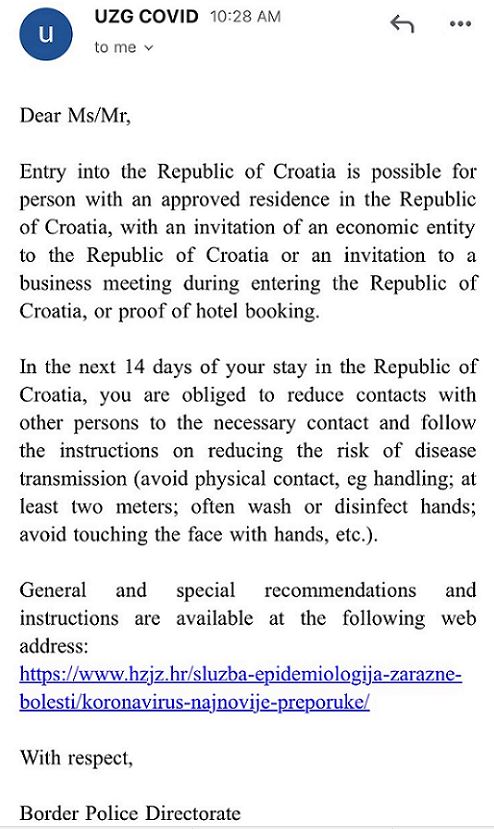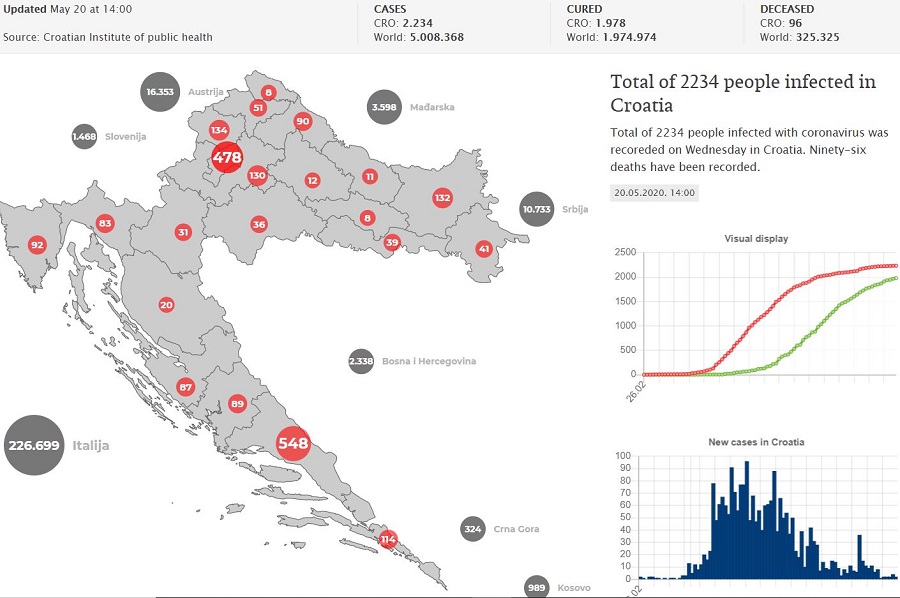New York Times Lists Dubrovnik Among 11 "Changed'' Global Destinations
The New York Times has published something about the famous Dalmatian city that nobody would have ever expected before coronavirus became a reality.
Before the coronavirus pandemic struck, the most frequent complaints you'd hear from residents of Croatia's tourist Mecca of Dubrovnik all involved too many tourists, a lack of proper infrastructure to cope with the crowds, damage to the UNESCO protected historic core, too many harmful cruise ships, and too much traffic.
Since coronavirus penetrated Croatia's borders, however, the situation has rather incredibly reversed almost entirely. What Dubrovnik strived for for many years has been acheived by no less than something invisible - a virus.
As Morski writes on the 19th of May, 2020, the popular and highly respected American publication the New York Times ranked Croatia's southernmost city of Dubrovnik among the eleven top global destinations that suddenly became peaceful places to live in the midst of the coronavirus pandemic, and until that crisis, they ''fought'' with excessive numbers of tourists, a situation which saw the coining of a brand new term - overtourism.
"The eleven most visited tourist destinations in the world have recently completely changed. In Venice, for example, there are currently more locals than there are tourists, which is an extremely rare situation for a city that has been struggling with overcrowding for years,'' writes the New York Times, whose online edition is followed by more than five million subscribers.
In addition to Dubrovnik and Venice, the list of such "changed" destinations also includes Rome, Bali, Iceland, Amsterdam, Barcelona, Paris, Prague, Halong Bay in Vietnam and the Galapagos Islands, reports the director of the Croatian National Tourist Board's office in New York, Ina Rodin.
The article also conveys the experiences of local residents in these destinations, and the situation in his native Dubrovnik was described by Darko Perojevic, chef and owner of the Azur restaurant, emphasising that the old town of Dubrovnik, where he has lived for most of his life, has not been so empty since the 1990s, when the city was ravaged by attacks by the Yugoslav People's Army.
Still, he admitted that it is now a special pleasure to walk through the empty city centre and see children playing in the streets.
"For a moment, it seems as if we've regained the city," said Perojevic, adding that the first quarantine was introduced in Dubrovnik in the 14th century to protect the local population from the plague. You can read more about that here.
For more, follow our travel page.
Croatia Supports Merkel-Macron Rescue Plan, Says Daily
ZAGREB, May 21, 2020 - The Croatian government support the establishment of a €500 billion European fund to help repair the economic damage from the coronavirus pandemic, Jutarnji List daily reports on Thursday, noting that the money to be obtained from the fund could be used for recovery in the tourism and transport sectors.
The government supports the Franco-German rescue plan, which, according to the proposal put forward by German Chancellor Angela Merkel and French President Emmanuel Macron, envisages the establishment of a €500 billion rescue fund which would be set up as part of the EU budget for the period 2021-2027 and be financed with loans to be sought by the European Commission, the daily says.
The money form the fund would be directed to regions and sectors worst hit by the coronavirus pandemic.
"We welcome the initiative, notably in the segment that refers to the sustainable recovery of the worst-hit EU sectors and regions. There are sectors in Croatia that have been affected, we have been affected as a country, and we also expect funding from the new Multiannual Financial Framework (MFF) for cohesion policy," Zvonimir Savic, Prime Minister Andrej Plenkovic's special advisor on economic affairs, told the daily.
Savic added that the amount that was being proposed was significant and that Croatia considered as important the fact that it would be part of the new MFF.
The initiative itself is a clear message of European solidarity and it is important that the proposal is being put in the context of the MFF because time must not be wasted, he said.
The new EU budget goes into force in 2021 and now is the ideal time for talks on the rescue plan, which, among other things, envisages strengthening the EU’s competences in the health sector, supporting the single internal market and, most importantly, supporting sectors and regions affected the most by the pandemic, Savic said.
HAMAG-BICRO Secured 230 Million Kuna in Support for 2500 Businesses
As Novac writes on the 21st of May, 2020, HAMAG-BICRO has stimulated the Croatian economy in the amount of 230 million kuna through measures introduced by the government, and within the aid package for micro, small and medium-sized businesses. As early as March the 6th, 2020, the aforementioned agency was one of the first to activate the implementation of six measures and in just two months, it provided liquidity for more than 500 businesses in the amount of more than 165 million kuna through loans.
HAMAG-BICRO's package of measures to help the economy, which adapted the existing four and introduced two new financial instruments, proved to be a timely response, which is reflected in the large number of received and processed applications. Comparing the numbers of received applications for HAMAG-BICRO loans, it can be seen that the agency received twice as many applications in just one month than for 2019 as a whole.
In addition to the large number of received liquidity requests from companies, over 2,000 businesses have requested a moratorium on the repayment of ESIF loans as well as loans for Agriculture and Rural Development. In this way, HAMAG-BICRO approved a moratorium in the amount of 62 million kuna of additional liquidity for Croatian businesses. Given the significant levels of interest from businesses, the total value of the measures to help the economy, which initially amounted to 1.148 billion kuna, increased to a massive 3 billion kuna.
The analysis of applications by counties shows that the largest number of received requests comes from the City of Zagreb, Split-Dalmatia and Primorje-Gorski Kotar counties. The most represented activities are the provision of accommodation, food preparation and serving and the processing industry, and in the new financial instrument known as the COVID-19 loan, the most heavily represented are those in the retail and wholesale trade.
Businesses still have access to existing HAMAG-BICRO programmes financed from ESI funds, which have been further adjusted by lowering interest rates to 0.1 percent and introducing a moratorium on debt repayment on all previously approved loans. In addition to the above, small business entities in the agricultural, processing and forestry sectors also have access to a Micro Loan for Rural Development for working capital in the amount of up to 25,000 kuna and an interest rate of 0.5 percent.
In addition to loans, ESIF Portfolio Guarantees, Individual Guarantees for Agriculture and Rural Development and the National Plus Programme are also available. In parallel with measures to help the economy, HAMAG-BICRO is working on the finalisation of the first programming period (2014-2020) for Croatia, within which five more tenders were opened: Integrator, Quality Labels, Product Certification to Market, and Innovation vouchers for SMEs.
All HAMAG-BICRO employees were mobilised and focused on the administrative and financial processing of all of these applications, but due to the fact that a large number of companies didn't submit complete documentation, the time for approving applications was slowed down. In the next ten days, the agency plans to administratively process all applications and intensively continue the process of approving loans in order to provide businesses with the fastest possible access to financing.
An overview of all open tenders, as well as measures to help businesses during the coronavirus epidemic is available on the official website of the agency.
For more, follow our business page.
Ex-HDZ Leader's Wife Released From Custody Pending Further Proceedings
ZAGREB, May 21, 2020 - Ana Karamarko, wife of former HDZ president Tomislav Karamarko, was released from custody on Wednesday evening because anti-corruption investigators did not ask that she be remanded in custody after earlier in the day she was arrested as part of an investigation into the suspected financial crime.
Karamarko was questioned on Wednesday evening by investigators with the Office for the Suppression of Corruption and Organised Crime (USKOK), after which she was released pending further proceedings, Hina learned from sources close to the investigation.
Her lawyer Ivo Farcic said that his client had denied any involvement in the criminal activity she is suspected of.
"She is suspected of issuing an invoice in the amount of HRK 400,000 for a service rendered, but she is not suspected of having kept the money for herself," Farcic said.
A decision on whether the other 30 people arrested as part of the investigation will be remanded in custody will be known after they are questioned. The investigation covers nine companies and 38 persons, one of whom has been in prison from before while six are currently beyond the reach of Croatian police.
Tomislav Pavkovic and Oliver Kolobaric are believed to have led the group suspected of conspiring for the purpose of evading taxes and customs duties, abuse of trust in business operations, and aiding and abetting the commission of those crimes.
The group, suspected of using fictitious contracts to siphon HRK 20 million from a number of companies, defrauding the state of HRK 11 million in the process, was allegedly put together by the two men.
The persons in question and their companies are suspected of charging non-existent services via fictitious invoices and tax fraud from 2017 until 2019.
The Wall Street Journal Calls Ratko Rudic Best Coach in World
May 21, 2020 - One of the world’s most respected and serious media outlets, The Wall Street Journal, featured Croatian water polo coach Ratko Rudic in the article titled “The World's Greatest Coast is Not Who You Think".
Index.hr reports that they then explained who they were referring to: "Ratko Rudic, a man who won four Olympic gold medals with three different national teams and who recently retired."
As he recently said in an interview with Index, Rudic also revealed to WSJ reporters that he is enjoying retirement by painting abstract works inspired by Dali and Pollock while listening to jazz by Mingus and Marsalis because, as he says, it is a "great combination".
Journalists Joshua Robinson and Ben Cohen explained that if most Americans have never heard the name Ratko Rudic, it is only because most Americans do not follow water polo.
To bring readers closer to the hero of the story, the WSJ reporters write that players feared Rudic as they did the ruthless Bill Belichick, the legendary American football coach, but at the same time, adored him as John Woode, the greatest coach of university basketball.
Rudic's impressive achievements are listed: appearances at nine Olympic Games, leading five national teams, winning five coaching and one player medal, of which as many as four are gold. It sounds almost unbelievable that 28 years have passed between his first and last Olympic gold medal. Thus, according to Olympic historian Bill Mallone - Rudić is, therefore, the longest-living athlete.
"After he did all this, led the national teams of Yugoslavia, Italy, the USA, Croatia and Brazil, a pandemic had to happen to drive Rudic into retirement," the text reads.
His former players say Rudic was the most inspiring leader they have ever met.
"He always knew he could get more from players than players can even imagine," said UCLA University water polo coach Adam Wright.
The article also recalled that the US national team, composed of students from the elite Berkeley and Stanford, realized who their coach was on two occasions. The first, after swimming drills went from three to 14 thousand meters, and when during preparations in Italy, where they practiced with the national team there, Rudic went crazy at the chef who gave the hosts vegetables at a joint dinner, and his team none.
With the slogan "we must suffer", Rudic exposed the Americans to exhausting, painful training for eight hours a day, twice a day for four hours. The players also had to accept Rudic's specialty - underwater wrestling - where the players had to keep each other underwater.
Given the brutal methods, charisma, and success, the authors of the text in the WSJ call Rudic "Michael Jordan with a better mustache".
You can read the full piece on WSJ here.
To read more about sport in Croatia, follow TCN's dedicated page.
Croatian Agency 'Human' Beats Google in Webby’s Best Practices Category
Human and Google won both the Jury and People’s Vote in the 2020 Webby Awards
ZAGREB, May 21st, 2020 - Croatian agency Human won the award for best website practices based on six main criteria of the IADAS academy at international Webby Awards, considered to be the web 'Oscars'.

Celebrating the best internet achievements in 2019, the awards received over 13,000 entries from 70 countries. Among the finalists were HBO, NASA, Spotify, Saturday Night Live and others. Except Google, Human also beat Samsung, KLM and Khan Academy in their category. By winning votes of both the Jury and People, Human proved a creative idea and some fine execution can beat big names in the industry.
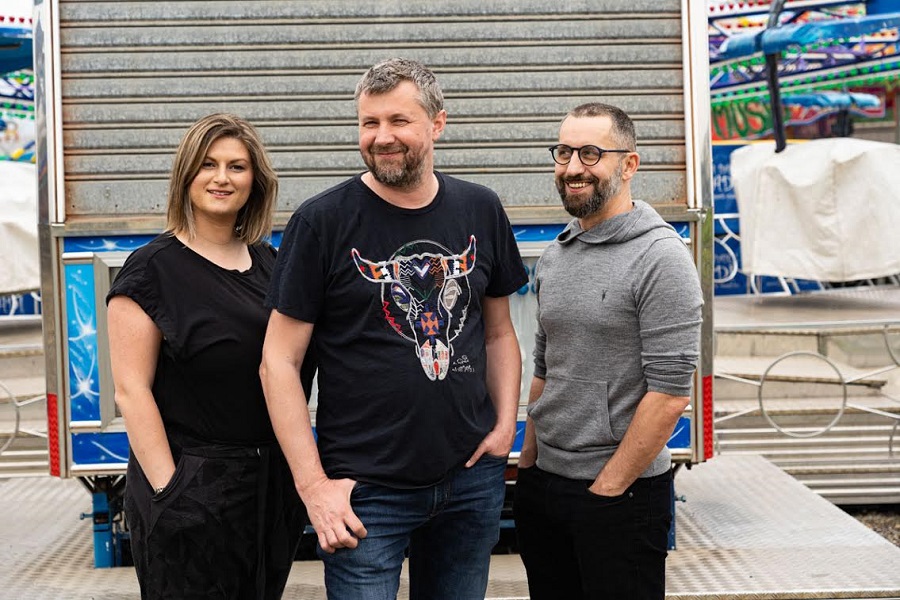
“From the moment we launched our website we’ve been getting praise, but being honored with such a large international award is appreciated and definitely the icing on our cake. Just by looking at the competition in our category and the resources they have at their disposal one can tell we’ve definitely done our job right. The Statuette is coming to Croatia.” commented Vanja Bertalan, CEO of Human.

Due to extraordinary circumstances, this year's award ceremony was held online. Among those receiving the highest honors are Nike, Spotify, National Geographic, Washington Post, HBO, Condé Nast as well as individuals awarded by the academy for their last year's digital activities. Those include Tom Hanks, Jimmy Fallon, Celine Dion, Lil Nas X, Greta Thunberg, and many others.

Webby Awards are considered to be one of the most prestigious in digital. Launched in 1996, Webby has received over 3.1 billion impressions through print, online, and broadcast channels.
Ministry of the Interior Responds to Croatian Travel Questions
May 21, 2020 - TCN recently sent MUP (the Ministry of the Interior) a set of questions regarding the current coronavirus-induced circumstances in which we all find ourselves, as well as a few other things. Here are those questions and MUP's response in full:
1. Who can enter Croatia at the moment?
Croatian citizens are allowed to enter the Republic of Croatia, while dual citizens at the Croatian border are treated as Croatian citizens and should be identified as such at the border crossing.
The amended Decision on the temporary ban on crossing the border crossings of the Republic of Croatia allows foreign citizens to enter the Republic of Croatia in the case of:
- business reasons or other economic interest for the Republic of Croatia,
- urgent personal reasons.
2. New measures have been announced which state that people can come if they have a holiday home here, hold legal residence, or if they have some economic reasons for entering. This is all a bit vague. Can you explain exactly what the new rules are and when they come into effect?
In the case of a business visit, EU/EEA citizens must present documentation at the Croatian border showing their economic interest in the Republic of Croatia or proof of the economic operator's interest in that person entering, or an invitation to a business meeting. This category also includes proof of paid accommodation or the reservation of an apartment/hotel, a contract on the lease of space in a camp, the reservation of a plot in a camp, the rent of a tourist boat or sailboat, paid or previously agreed tourist tours of the Republic of Croatia and other things which fall onto the spectrum of tourist activities, the co-ownership shares in companies registered in the Republic of Croatia, visits to dental clinics, etc.
In the case of urgent personal reasons, foreign citizens must have documentation proving the possession of property located in the Republic of Croatia, or the ownership of a vessel, documentation from which it is evident that the arrival is for the purpose of burying/attending the funeral of a family member. Under this category, a possible reason may be the the care of family members, especially those who are older, coming to participate in court hearings or taking the state exam, coming to financial institutions if foreigners receive a salary or pension from a Croatian employer, the wedding of a family member, etc.
This covers most of the current requests of foreigners to enter the Republic of Croatia, while in all other cases not listed above, and we cannot assume them at this time, foreigners can send their inquiry to This email address is being protected from spambots. You need JavaScript enabled to view it. and they will receive an answer as to whether or not they meet the conditions for the granting of entry into the Republic of Croatia.
These categories of persons will not be assigned a measure of self-isolation, since then they would not be able to fulfill the purpose of their visit if they undertake it, but they must follow the recommendations and instructions of the CNIPH that they will receive at the border crossing.
3. Will Croatia's borders be open to nationals from every country? Will the borders be opened at the same time? There was talk of the Slovenian border opening first for Slovenians only, then Austrians. A definitive list of which borders when and for whom would clear up a lot of confusion...
We'd like to further inform people that all international border crossings in the Republic of Croatia are now open.
4. What is the procedure regarding testing and self-isolation? Are tourists required to take a test? If yes, who pays and how much?
Testing for COVID-19 is not required for Croatian or foreign citizens, nor is a quarantine/self-isolation measure prescribed.
Persons coming to the Republic of Croatia are obliged to follow the recommendations and instructions of the CNIPH that they will receive at the border crossing, in which it is recommended to limit contacts with other persons and to perform only the most necessary and urgent tasks outside their home within 14 days of entry into the Republic of Croatia. All instructions and recommendations of the Croatian Institute of Public Health are published on their website.
A note from TCN - Foreign nationals with legal residence (the possession of a temporary or permanent residence card) are free to enter Croatia under the same rules as Croatian nationals.
5. Are UK nationals still covered by EU health cover (European Health Insurance Card/EHIC) until 2020?
Regarding health insurance during your stay in the Republic of Croatia, we would like to inform you that the answering of this question is the responsibility of the Ministry of Health and we advise you to contact the competent ministry for an answer.
6. Does ''borders are now open to EU citizens'' include people from the UK?
In regard to British citizens, we would like to inform you that the above rules which apply to EU citizens continue to apply to British citizens until the 31st of December 2020. We'd like to inform you that the Decision on the temporary prohibition of crossing the border of the Republic of Croatia prescribes exceptions when crossing the border, and they refer to emergency medical cases, the crossing of medical staff, diplomatic staff, police officers, family reunification cases and the like. Foreign citizens who hold regulated (legal/valid) permanent or temporary residence in the Republic of Croatia may enter the Republic of Croatia without the need to meet any preconditions.
7. Is there any news on when flights from outside the EU (apart from the UK) are scheduled to resume?
In regard to the question regarding the re-establishment of flights with countries outside the EU, we currently don't have any information on when they will be back in operation. You might contact airport operators for more information on that matter.
8. What are the procedures for people sailing and arriving in Croatia from other countries on the Adriatic?
Regarding the entry of ships, we'd like to inform you that the last Decision of the National Civil Protection Headquarters of the Republic of Croatia of the 18th of May, 2020, repealed [previous] Decisions prohibiting ships in international navigation which had the obligation to enter into self-isolation or quarantine upon entering seaports and inland ports Of the Republic of Croatia. The same Decision enacted the necessary measure prohibiting the entry of passenger ships and international cruises carrying more than forty passengers into seaports and inland ports in Croatia. Since there are now no restrictions (except those for cruise ships), ships, boats and yachts can enter the Republic of Croatia, after which they're required to enter a port which is open to international maritime traffic for border control.
All information from the competent institutions and other stakeholders regarding the situation caused by the spread of the COVID-19 virus is regularly published and updated on the official website Koronavirus.hr, while all Decisions taken by the National Civil Protection Headquarters can be found by clicking this link.
9. What about tourists already in Croatia, whose visas have expired?
Regarding your question about foreign citizens in Croatia who aren't able to leave the Republic of Croatia for objective reasons within the period prescribed by the Schengen Borders Code, the Ministry of the Interior of the Republic of Croatia issued a statement on the 30th of March, 2020, in both Croatian and English, which can be accessed by clicking here.
In addition, on April the 16th, 2020, the Croatian Government adopted amendments relating to foreigners and third-country nationals (who do not hold residence in Croatia) during the epidemic, about which we also informed the public. You can read more here.
10. What if I or someone I'm travelling with develops symptoms while on holiday in Croatia?
Regarding the issue of the procedure in case of the development of symptoms during a stay in Croatia, what needs to be done is described in the recommendations and instructions of the Croatian Institute of Public Health for Croatian and foreign citizens when crossing the border and entering the Republic of Croatia.
Upon entering the Republic of Croatia, if someone develops symptoms of the new coronavirus, they must stay in their accommodation and call their host, ie the organiser of their arrival, who then must inform the epidemiologist responsible for their area, or contact their local physician for further advice. If the symptoms develop outside of the working hours of the competent primary care physician, the host can contact the emergency medical services or the nearest coronavirus clinic by phone if the person in question has developed more pronounced symptoms of the new coronavirus.
11. The situation can change rapidly. Do travellers have to worry a spike in new infections in their home country means that Croatia could prevent them from entering?
Regarding your question regarding measures, ie restrictions during the tourist season, we'd like to inform you that the European Commission has issued several documents related to the reactivation of tourism as one of the most important branches of the economy in Europe, and agreements and talks are underway. This is something that will be agreed both with neighbouring countries and at the level of the European Union.
Regarding the issue of the potential for further changes in the measures, ie, restrictions related to the COVID-19 epidemic, we would like to inform you that they depend on the further development of the epidemiological situation and that it isn't possible to predict them.
Korona u Hrvatskoj: putovanja, turizam, letovi i granice; stanje 21. svibnja 2020.
21. svibnja 2020. - Donosimo vam posljednje informacije o putovanjima u Hrvatskoj za vrijeme korone, dok Viber zajednica Total Croatia Travel INFO i dalje raste.
Vrlo polagano savjeti o putovanjima u Hrvatskoj postaju nešto jasniji. Do sada je TCN redovito detaljno izvještavao o aktualnoj situaciji, a posljednji takav izvještaj na engleskom jeziku od 19. svibnja možete pronaći ovdje.
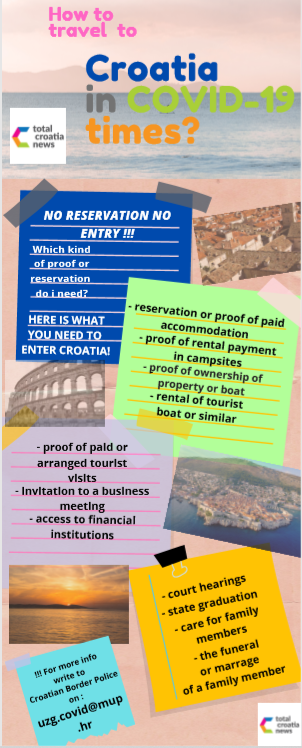
(TCN-ova infografika s najvažnijim naglascima)
Čini se da su službene instance u Hrvatskoj konačno počele organizirati neke podatke na jednom mjestu, a službeni su podaci - ili bi barem trebali biti - najpouzdaniji.
Stoga će današnji izvještaj zapravo biti serija linkova na mjesta gdje možete pronaći najbolje informacije. Također, dajemo vam i adrese e-maila preko kojih možete pisati Ministarstvu turizma i nacionalnoj Hrvatskoj turističkoj zajednici.
Turistička zajednica ima stranicu s pitanjima i odgovorima o Koroni, koju sad redovito ažuriraju. Ako ne možete tamo pronaći podatke koje tražite, službeni savjet jest: Za pitanja vezana za putovanja u Hrvatsku, a koja nisu odgovorena na ovoj stranici, pošaljite e-mail na adresu This email address is being protected from spambots. You need JavaScript enabled to view it., cc This email address is being protected from spambots. You need JavaScript enabled to view it..
Postoji još jedna predložena adresa e-maila za kontakt, ponovo sa službene stranice: "Svi drugi strani državljani koji imaju poslovni razlog, a koji se sad ne može predvidjeti, a koji nemaju potrebnu dokumentaciju, trebali bi poslati svoju namjeru da prijeđu državnu granicu (uđu u Republiku Hrvatsku) na adresu emaila This email address is being protected from spambots. You need JavaScript enabled to view it., a njihov će zahtjev biti riješen u najkraćem mogućem vremenu.
Evo i linka na stranicu Ministarstva turizma o COVID-19 - sretno!
Možete pratiti i službenu web-stranicu Vlade posvećenu Koronavirusu, koja ima i dio na engleskom jeziku. Ona svaki dan donosi nove podatke o oboljelima u 14 sati, te daje korisne informacije na engleskom jeziku. Među posljednjim člancima ističu se:
Preporuke Hrvatskog zavoda za javno zdravstvo za hrvatske i strane državljane za prelazak granice.
Idete na put? Sve informacije na jednom mjestu!
Granice
Službene trenuačne informacije o stanju na granicama, HAK.
Slovenija ukida sva ograničenja za hrvatske državljane koji ulaze na njihov teritorij. (19. svibnja)
Ministar turizma otkriva kad će se granice otvoriti za Slovake, Čehe, Mađare i Austrijance. (20. svibnja)
Izvještaj s putovanja: vožnja iz Velike Britanije do Hrvatske 19.-20. svibnja 2020. (20. svibnja)
TCN posjećuje granicu sa Slovenijom 17. svibnja 2020., kako bismo se uvjerili u procedure i stanje na terenu. (17. svibnja)
Možete proći kroz Bosnu i Hercegovinu kako biste došli u Hrvatsku. Ovdje pronađite službene informacije o putovanju u BiH.
Čitatelj je primio ovaj odgovor kad je pitao kako prijeći granicu. Link na dnu vodi na stranicu na hrvatskom jeziku, iako s te stranice možete doći do engleske verzije.
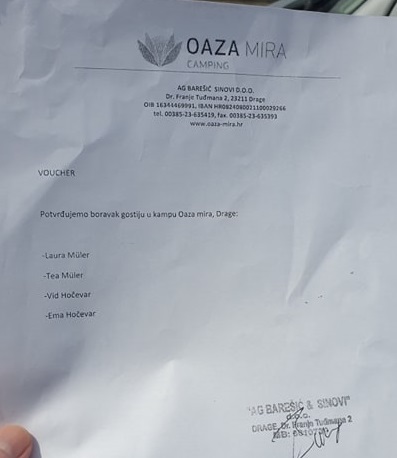
Postoji doza nejasnoće oko toga trebate li imati pečatiranu potvrdu da imate rezervirani smještaj i/ili dogovoren poslovni sastanak. Moje iskustvo s hrvatskom birokracijom jest da nikad ne možete imati dovoljno pečata na svojim dokumentima, stoga vam savjetujem da nabavite barem neki pečat. Kad sam 17. svibnja otišao na granicu kako bih iz prve ruke vidio stanje, jedan je slovenski turist zamolio smještaj u Hrvatskoj da mu izdaju ovo. Ali, to će vam moći potvrditi Ministarstvo na This email address is being protected from spambots. You need JavaScript enabled to view it..
Ovo su službeni savjeti iz Bosne i Hercegovine o tome kako ući u Hrvatsku (možda ovi savjeti postoje i na nekoj službenoj hrvatskoj stranici, ali ja ih ne mogu pronaći):
Ako strani državljanin želi prijeći državnu granicu, mora ispuniti jedan od sljedećih uvjeta:
1. posjedovati dokumentaciju koji dokazuje vlasništvo nad nekretninom u Republici Hrvatskoj ili vozila (vrijedi i za najam), ili dolazi u Republiku Hrvatsku na pogreb (treba posjedovati prikladnu dokumentaciju za to dokazati). Nakon što ispune uvjete, strani državljani mogu prijeći državnu granicu, te ih se registrira te unosi mjesto/adresa gdje će odsjesti ili gdje posjeduju imovinu, broj telefona za kontakt i vrijeme boravka, odnosno kad planiraju napustiti Republiku Hrvatsku.
2. Ako imaju dokumentaciju koja dokazuje poziv neke hrvatske tvrtke, ili poziv na poslovni sastanak. Za ove putnike, neophodno je unijeti mjesto/adresu gdje će odsjesti, kao i broj telefona za kontakt te vrijeme boravka, odnosno kad planiraju napustiti Republiku Hrvatsku.
3. Svi drugi strani državljani koji imaju poslovni razlog, koji ne može biti predviđen u ovom trenutku, te nemaju potrebnu dokumentaciju, trebaju biti upućeni da svoju namjeru da prijeđu državnu granicu (uđu u Republiku Hrvatsku) najave na adresu e-maila This email address is being protected from spambots. You need JavaScript enabled to view it. na što će im biti odgovoreno u najkraćem mogućem roku.
Cestovni promet
Najnovije informacije iz HAK-a.
Trajekti
Najnovije informacije iz HAK-a.
Raspored trajekata i katamarana Jadrolinije.
Zračni promet
Detaljnu analizu zračnog prometa u Hrvatskoj u budućnosti možete pročitati u nedavnom intervjuu s Maxom Oldorfom, COO-om tvrtke ch-aviation :
Letovi prema Hrvatskoj nakon korone: Max Oldorf iz ch-aviation
Croatia Airlines upravo je objavila ažurirani red letenja za 21.-28. svibnja. Sljedeći tjedan dodat će i liniju Amsterdam - Zagreb. Puni raspored.
Od 4. svibnja 2020. na svim letovima Croatia Airlinesa obavezno je nositi maske na licu. Svi putnici obavezni su tijekom leta imati na licu maske ili druga prihvatljiva pokrivala. Maske na licu moraju biti tijekom cijelog boravka u kabini letjelice.
Prihvatljiva rješenja:
pamučne maske za lice s dva sloja
medicinske (kiruruške) maske
filtrirajuće maske s ili bez ventila (FFP2 ili N95)
Kontaktni centar CA: 0800 77 77 (besplatni pozivi iz Hrvatske), 072 500 505 ili +385 1 66 76 555. Za više detalja pogledajte link.
Zračna luka Dobrovnik- Ponovo se uspostavlja let na relaciji Zagreb-Dubrovnik-Zagreb od 11. 5. 2020. Croatia Airlines će letjeti dva puta dnevno. Više informacija.
Zračna luka Osijek - Od 27. 4. ponovo se otvara poslovnica u Pothodniku. Dok su na snazi mjere prevencije, bit će otvorena 9-17 radnim danima. Više informacija možete dobiti na e-mailu This email address is being protected from spambots. You need JavaScript enabled to view it. i telefonu +38531284611. Preporuča se postavljanje pitanja na navedenu adresu emaila. Više informacija.
Zračna luka Rijeka - Više informacija.
Zračna luka Zagreb - Više informacija.
AirBaltic - Svi letovi AirBaltica su otkazani od 17. 3. do 17. 5. 2020. connections are suspended from March 17 to May 17, 2020. Više informacija.
Air France - Od 11. svibnja, maske su obavezne na svm letovima. Zbog korona virusa, smanjili su broj letova za 90 % i to smanjenje vrijedi do kraja svibnja. Zbog zatvaranja zračne luke Paris-Orly, svi letovi idu preko zračne luke Paris-Charles de Gaulle. Više informacija.
Air Canada je otkazala sve letove između Toronta i Zagreba tijekom ljeta 2020.
Austrian Airlines, dio Lufthanse, odlučio je otkazati sve letove do kraja svibnja 2020. Više informacija.
British Airways - Najnovije informacije.
Czech Airlines - Maske su obavezne na svim letovima. Više informacija o rasporedu letenja.
easyJet - Odlučili su prizemljiti sve letjelice do daljnjega. Više informacija.
Emirates - Emirates ponovo pokrenuo ograničen broj putničkih letova za putnike koji napuštaju UAE. Više informacija.
Germanwings - Germanwings više ne leti.
KLM - Posljednji podaci.
Lufthansa - Više informacija.
Ryanair - Ograničeni raspored letova koji vrijedi do 28. svibnja 2020. Više informacija.
Turkish Airlines - Svi međunarodni letovi su otkazani do 28. svibnja 2020. Više informacija.
Qatar Airways - svi direktni letovi između Zagreba i Dohe su otkazani do 31. svibnja 2020. Fleksibilost pri promjeni planova letenja do 30. rujna 2020. Za više informacija, obratite se direktno njihovom uredu u Zagrebu na +385 (0)1-4961110 / 111, e-mail: This email address is being protected from spambots. You need JavaScript enabled to view it. ili ovdje provjerite detalje.
Wizz Air - Početkom svibnja lete iz Budimpešte za Atenu, Barcelonu, Berlin, Birmingham, Basel, Dortmund, Eindhoven, Gothenburg, London, Liverpool, Madrid, Podgoricu, Sarajevo, Stockholm and Targa Mures. Više informacija.
Sve gore navedeno su službene informacije. Dolje pogledajte popis članaka na TCN-u (na engleskom jeziku) koji se osvrću na vijesti iz zračnog prometa:
Eurowings to Resume Flights - Timetable Here
Flights to Croatia: Korean Low Cost Carrier T’Way Planning flights from Seoul (May 19)
Ryanair Significantly Reduces Summer Routes to Croatia (May 18)
Is Eurowings Returning to Croatia this Summer? (May 16)
Croatia Airlines Already Beginning to Reduce Number of Flights (May 16)
Hope for 2021? American Airlines Dubrovnik - Philadelphia Loaded for June 4, 2021 (May 14)
CEO Eddie Wilson: Ryanair Zadar Base Will Not Go Ahead (May 13)
Ryanair to Croatia Planned for July: Zadar, Split, Dubrovnik, Rijeka, Pula Flight Info (May 12)
British Airways Will Fly to Zagreb and Split from June (May 12)
Flights to Croatia: Korean Air Cancels Seasonal Zagreb Service, Air Transat Delayed (May 9)
Vlakovi
Najnoviji podaci HAK-a o željezničkom prometu.
Autobusne linije
Najbolji izvor podataka o rasporedima autobusnih linija pronašli smo na stranici GetByBus.
Situacija se stalno mijenja, te da biste dobili najnovije vijesti o prometnom stanju i drugim aspektima krize uzrokovane koronavirusom, predlažemo vam da pratite stranicu na TCN-u posvećenu COVID-19.
Recent relevant tourism-related articles
Tourism in the Corona Age: 10 Virtual Ways to Discover Stari Grad
Dubrovnik Announces Marketing Plan to Bring Back Airlines
Visit Zagreb Now: Never Has the City Been More Beautiful
Listen to the Free Daily Concerts on Hvar: Birdsong Live
Dubrovnik Finally Realises City Wall Prices Are Extortionate, Price Slashed
Czechia to Open Borders for Croatians as of 8 June
Easing Coronavirus Measures, Around 8700 Tourists Arrive in Croatia
Ako imate relevantne i potvrđene turističke informacije koje biste rado vidjeli na ovom popisu, molimo vas pošaljite nam ih na This email address is being protected from spambots. You need JavaScript enabled to view it., sa naslovom Travel update.
Jeste li se već priključili Viber zajednici Total Croatia Travel INFO? Pročitajte o njoj više ovdje.
Dnevno ažurirane vijesti, podaci iz priopćenja za medije u 14:00
Posljednji podaci i statistike o COVID-19 u Hrvatskoj, Velebit.ai
20. svibnja Nacionalni stožer civilne zaštite objavio je:
U Hrvatskoj ima 2234 slučajeva infekcije koronavirusom, 2 nova slučaja u posljednjih 24 sata. Preminulo je 96 ljudi, oporavilo se 1978 bolesnika. Trenutačno je na respiratoru 8 bolesnika.
Do sada je testirano ukupno 57,021 ljudi, od čega 1221 u posljednja 24 sata.
Krka Bike Project: NP Krka Offer Enriched by 470 Kilometers of Cycling Routes
May 21, 2020 - In the twenty months since its opening, over 470 kilometers of well-maintained cycling routes in the Krka National Park, which pass through the untouched nature of the most beautiful part of the Krka River, have become a favorite destination for lovers of active holidays.
HRTurizam writes that the most attractive parts of the Park are connected with as many as 14 circular bicycle routes of different levels of difficulty with appropriate cycling signals, and the ideal combination of varying terrain configurations and rich natural and cultural heritage allows you to discover the famous destination in a completely different and sustainable way.
Whether it is for beginners, recreationalists or professionals - five MTB or mountain bike routes, three road routes, and six track routes for a pleasant family ride, will satisfy different adventurous needs and tastes.
"With the Krka Bike project, we wanted to strengthen the development potential of cycling tourism in NP Krka since it is a sustainable type of tourism that has a number of advantages - from individual ones such as a positive impact on health, to broader ones concerning the impact on local economic activities. At the same time, biking and trekking have a slight impact on the environment, which is extremely important to us since the routes are located in the protected nature of the Park," said the director of the Public Institution "Krka National Park" Nella Slavica, and added:
"Apart from offering an excellent opportunity to meet natural beauties that you did not even know existed, our cycling routes also have an educational role because they reveal the hidden treasures of the rich cultural and historical heritage preserved by the Krka National Park."
The most willing adventurers will surely dare to ride the longest "Royal route", which is 95.1 km in length, begins in front of the Branch Office of the Park in Skradin, passes through the towns of Rupe and Kistanje, and ends in the pearl of ancient history, the Roman military camp Burnum. On the way back to Skradin, it descends twice into the Krka river canyon, to the Brljan and Roški waterfalls, and after the visitor center in Laškovica, which is the center of a network of hiking and cycling routes along the river Krka, returns to Skradin by the same route. The shortest cycling route, 8.6 km long, from Skradin along the Krka leads upstream to Skradinski buk, the most beautiful and most visited waterfall on the Krka river.
More information on cycling routes, maps and GPS coordinates as well as rules of conduct for cyclists can be found on the Krka Bike website.
To read more about lifestyle in Croatia, follow TCN's dedicated page.
Flights to Croatia: Brussels Airlines Cancels Zagreb and Zadar, Eurowings Resumes in June
May 21, 2020 - The latest news from around Croatia’s airports for flights to Croatia with updates from Zagreb, Zadar, and Split.
Croatian Aviation reports that Brussels Airlines announced on Tuesday that in its current summer flight schedule, it would not fly to two destinations in Croatia - Zagreb and Zadar.
The company decided to cancel all unprofitable lines, as well as those bordering on profitability (in Spain, France, Portugal, Germany, Greece), which led to the cancellation of two lines to Croatia.
For now, Brussels Airlines will keep the Brussels-Split and Brussels-Dubrovnik routes on sale, while the routes to Zadar and Zagreb have been withdrawn from sale.
The Brussels-Zadar line was introduced in May 2018 as a seasonal line, while the line between Brussels and Zagreb was introduced in 2015.
On the route between Zagreb and Brussels, there will still be the option of a direct flight, as Croatia Airlines operates between these two cities twice a day in the conditions of normal air traffic.
Furthermore, Ex Yu Aviation announced that Eurowings would grow its presence in Croatia, but at reduced frequencies.
Namely, Eurowings will add services to the Croatian coast by resuming flights from Stuttgart, Hamburg and Dusseldorf to Split.
Its Cologne-Zagreb service, which has been maintained throughout most of the coronavirus pandemic, will be reduced from two to one per week in June. The lines from Hamburg and Dusseldorf to Rijeka, Dusseldorf to Pula and Cologne to Zadar will resume once per week on June 20.
“We can feel the growing desire of people to travel again and relax and enjoy their holidays after a long period of travel bans. This is exactly what we are now making possible with our extended summer schedule – reliably, safely and with all due caution. Travelling, whether private or professional, will be possible again," said Eurowings’ CEO, Jens Bischo.
Ex Yu Aviation adds that Eurowings’ parent company Lufthansa will not resume any of its destinations in the former Yugoslavia before June 15. You can read more about that on Ex Yu Aviation.
To read more about travel in Croatia, follow TCN's dedicated page.


